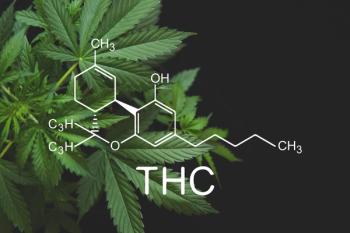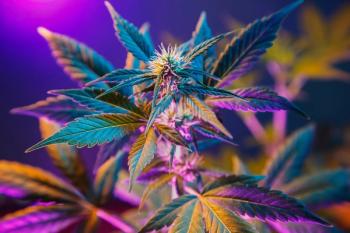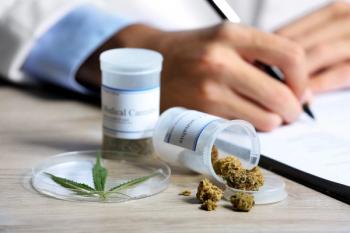
- October 2022
- Volume 3
- Issue 3
- Pages: 27-30
Medical Cannabis Helped Beat the Odds: Brooklyn Hall’s Fight to Survive Brain Cancer
When she was three-and-a-half years old, Brooklyn Hall was diagnosed with anaplastic ependymoma, class 3, a rare and unique form of brain cancer. Here, her mother Meghan Hall shares how Brooklyn’s prognosis drastically changed with the help of Rick Simpson Oil.
When she was three-and-a-half years old, Brooklyn Hall was diagnosed with anaplastic ependymoma, class 3, a rare and unique form of brain cancer. At death’s doorstep, her mother, Meghan Hall sought out cannabis as a healing treatment for her daughter. Rick Simpson Oil (RSO) changed Brooklyn’s diagnosis and she is now living a cancer-free life. Here, Meghan details how cannabis helped Brooklyn and continues to help her live out her childhood.
No parent ever wants to hear that their child has cancer. It is a soul crushing moment where all time stands still, and hope feels lost. As a parent, all you want is for your child to be happy and to protect them. Receiving a cancer diagnosis and seeing your kid go through treatment that makes them sicker before they can feel better, is traumatic for parents and families because they can’t take some of that pain and discomfort away. Pediatric cancer only receives 4% of government funding (1). It is not researched as heavily as more prevalent cancers such as breast cancer, prostate cancer, and pancreatic cancer. For parents living through a pediatric cancer diagnosis, this realization can be a tough pill to swallow.
One such family went through their worst nightmare. At the young age of three-and-a-half, Meghan and Kurt Hall's daughter, Brooklyn, was diagnosed with anaplastic ependymoma, class 3, which is a rare and unique form of brain cancer. “This type of cancer is typically found on the brainstem, and it’s usually found pretty quickly. But Brooklyn’s was super unique. It was found in the frontal lobe of her brain, and it was the size of a baseball,” Hall said. Due to its size, doctors immediately labeled Brooklyn’s tumor as cancerous. Once doctors revealed their suspicions, Brooklyn was intubated and rushed into emergency brain surgery.
The Path to Medical Cannabis
Prior to receiving her diagnosis, Brooklyn was hitting all her milestones like a healthy child. It wasn’t until she had been sneezing for three days that her parents began to worry as the repeated sneezing had started to affect her equilibrium. Assuming it was just a sinus or ear infection, they took Brooklyn to the pediatrician which ultimately led them to the emergency room where they performed the scan that disclosed the baseball-sized tumor residing in her brain. “It was massive. I’m surprised that we didn’t see any symptoms sooner, but because of where it was in the brain, it had time to grow and hide,” Hall explained. “She was immediately rushed into emergency brain surgery. The resection took 8 hours, but they removed the entire tumor. As soon as they did that though, Brooklyn acquired a traumatic brain injury (TBI) to her frontal lobe, and she was paralyzed on the right side.”
After the TBI, Brooklyn needed to relearn how to sit up, hold a cup, walk, and be re-potty trained, among other things. After 30 days in the hospital, Brooklyn was accepted into a research study at St. Jude Children’s Research Hospital in Memphis, Tennessee. At St. Jude’s, she was treated with 33 rounds of radiation, a mixture of photon and proton beam radiation. For three months, she underwent this treatment until they were told she was “cancer free” and were sent home to enjoy their “new normal.” Then, 8 months later and just a week before Christmas in December 2018, doctors detected three new tumors. Brooklyn was given a six-month terminal prognosis and discharged from St. Jude’s because there were no studies targeting three ependymomas; she no longer fit in their study. Not willing to give up the fight, the Hall’s sought treatment back home in New York for Brooklyn. Doctors suggested oral chemotherapy. “You’re basically feeding your kid straight up poison and that’s a lot to carry as a parent, especially when you're telling them it's medicine. We decided to try chemo because our doctors suggested it. And that will forever be my biggest regret as a mother—chemo,” Hall said. “You're completely backed into a corner, overcome by fear, and you're given no good options. All your options are horrible, and you have to make the best choice possible. You’re not given any good choices. So being in that position, you are desperate. You’re desperate to save your kid and watching her slowly suffer like that, it’s not anything I would wish upon anybody.”
Facing these tough options, Hall decided to research and seek out further information regarding the benefits of medical cannabis to help her daughter. “To protect myself and my family, I pushed for a medical card for Brooklyn, even though I didn’t technically use the medical card. I feel like there’s a lot of ignorance when it comes to cannabis. They really don’t understand how the plant works. And, unfortunately, doctors can only prescribe two cannabinoids when there’s an entire plant full of hundreds of them that they completely ignore. So, I pushed for a medical card, and I got it. And then I networked, and I found the right medicine for her,” said Hall. “I think that might be one of the most frustrating parts about choosing cannabis is that each state has their own regulations, which makes it hard to find legal access, or the right medicine. On a federal level, it’s still considered a Schedule I drug. So, each state has its own little rules. I live in New York so right now cannabis is completely legal, but it wasn't when we started our journey. We started giving her cannabis around her fifth birthday, a little over 3 years ago, and there were very little options in New York at that time. In fact, you could only legally purchase a THC percentage of 15%. Even now a doctor can only prescribe THC and CBD.”
Eventually, they determined that Brooklyn needed full whole plant medicine which couldn’t be legally purchased in their home state. Hall explained how she would often travel out of state to receive the cannabis that would ultimately help her daughter. “The laws that are put in front of you, which cause you to either choose to obey and watch your kids suffer, or you have to push through it and say, ‘Nope, I’m going to save my kid.’ So, I weighed my options. I feel like in 20 years, Brooklyn’s still going to be here and I will win either way, even if it ever came back on me, I still win because she is still here, and she is healthy,” said Hall.
As a parent, the most important thing is their child’s health and wellbeing. Chemo was causing her daughter to get sicker rather than help her feel better. Before cannabis, Brooklyn was on death’s doorstep. Her parents decided to use Rick Simpson Oil (RSO), which contains a high tetrahydrocannabinol (THC) percentage and is extracted from the Indica plant. In the beginning, it was used alongside the chemotherapy, but the RSO had no chance to fight back from the chemo. After a few months of using them together, Brooklyn’s parents decided to cancel all "big pharma" treatments, this included the chemo and radiation treatments. They went all in on cannabis as their miracle plant. “As soon as we did that, and I’m not joking, it was almost overnight. When we were using the chemo, she developed these horrible mouth sores which prevented her from eating, and she was almost completely nonverbal. She was pointing and grunting, that's it. She was on the couch all the time. She would sleep a lot, and was just lethargic. She had no quality of life. As soon as we stopped using the chemo, she started talking again,” said Hall. “Once we started just sticking to cannabis, it was like she did a complete 180. It was like within a week, I saw a completely different kid and it gave me so much hope. To the point that now I push everybody to look into it because it was such a profound impact on her life that I truly wish every parent would look at it the way that I did. I mean, our kids are here for a second, right? They’re here for a second. And all they know is pain. This gave her quality of life. This gave her happiness. This gave her the ability to eat. I mean, it gave me my daughter back.”
Overcoming Challenges
It wasn’t easy originally to decide to use cannabis. Since her daughter was a minor, there are certain laws and regulations which create a stickier situation. The best way to get informed was to do her own research. Hall started watching documentaries, discussing with people in the cannabis industry, and joining Facebook groups to weigh all her options before diving into cannabis as a treatment plan.
“She can’t die from cannabis. She can’t overdose from this. There are no long-term side effects,” said Hall. “The worst short term side effect I saw was that she slept. She slept a lot. When you’re looking at all the options in front of you and none of them are good, cannabis makes the most sense. I honestly speak about it so much because we shouldn’t wait until the last second to do this. We should know ahead of time. Our kids don’t have to suffer like that. They could try a plant, and maybe it’ll work, maybe it won’t, but it’s not invasive. It’s way less invasive than chemo or radiation and I just, honestly, I want to give my daughter the best quality of life. That’s what cannabis gave her.”
During Brooklyn’s pharmaceutical treatment plan, her body was just skin and bones. There was no meat on her. It was destroying her body, ultimately killing her. To deal with the pain, doctors had prescribed her morphine. “That was the real kicker for me. We give our kids these treatments and you trust your doctors and you trust the medicine they prescribe you. But in 20 years, am I going to have to deal with addiction issues because of the things she was prescribed? And it wasn’t helping her. We ended up bringing her to the hospital at one point because, I mean, she was dying and they wanted to hook her up to a morphine IV because the oral morphine wasn’t enough,” Hall said.
Once medical professionals wanted to put an IV in her daughter’s arm, Hall had enough. Switching to RSO, they bumped up her dosage and cannabis offered hope. The plant provided a profound impact on her healing and gave Brooklyn her quality of life back. Ever since her fifth birthday, she takes RSO every night. During the day, Brooklyn sometimes will have a gummy containing around 5 mg of THC to help her mood and irritability caused from the TBI. Hall utilizes RSO to maintain her daughter’s cancer diagnosis. The tumors have shrunk and disappeared. She is currently considered cancer free, but she's not out of the woods according to her doctors. Brooklyn receives maintenance scans once a year now to watch for any new tumors.
Cannabis is one of the most scrutinized and judged plants on the planet. Giving this miracle plant to her daughter, Hall knew she was going to receive criticism on this decision. “Cancer parents are judged in general. We’re often called scammers or accused of milking it. But this is our forever. We’re blindsided by it, and then forced to keep our ship afloat, and it’s constantly sinking. So, just being a cancer parent, you’re going to receive judgment,” Hall explained.
She received judgement every step of the way from family, friends, strangers on Facebook, doctors, fellow advocates, and more. “I’m always going to be her advocate and I’m always going to tell her story. I’ll always be an advocate for kids on cannabis because somewhere there is somebody just like me that needs to hear this story. And that’s the person I’m trying to reach. I don’t care who I irritate along the way. People should be mad. They should be mad! Our babies deserve better options, and I won’t stop advocating until plant medicine is considered a basic human right,” said Hall. “I know my baby better than anybody. She’s a part of me. I know what’s best for her. I’m not going to listen to some doctor or some weirdo on the street. Besides, quiet women never change history and I’ve never been quiet, and neither is Brooklyn.”
Hall never gave up fighting for her child. Cannabis saved her daughters’ life. Now, Brooklyn has a more normal life filled with playing and being a kid, which is all the Hall family could ever ask for.
Conclusion
Brooklyn’s story is one of many; each medical cannabis patient is unique, but they all are connected by one plant—cannabis. Hall grew up as a D.A.R.E. kid. Cannabis was supposed to be bad and dangerous. Through her research and learning from others familiar with the plant, Hall became an advocate for her daughter, but also for all of the children and parents battling pediatric cancer. “Nothing will ever change if we do nothing. I didn’t know this life and I didn’t know about 4% until it blindsided me and it became my kid. It’s not as rare as you think it is. I never thought this would be my life. I never thought I would be a cancer parent. But it happens,” Hall said.
Not many people openly discuss sick children, especially those suffering from cancer. Hall believes that by sharing her story about her daughter’s lifesaving experience with cannabis, it will encourage other parents and other people to share their stories and fight for more research as well as federal law changes. To see the changes you want, you will need to live a little dangerously and have hope in cannabis. This miracle plant has an overwhelming value in the medical field. Brooklyn’s life was changed by it in the most inspiring way, it gives hope which is very hard to find when fighting pediatric cancer.
References
Articles in this issue
about 3 years ago
Cannabis Patient Care October 2022 Digital Editionabout 3 years ago
Overview of the Research on Cannabis for Pediatric Oncologyabout 3 years ago
Cannabis for Children with Cancerabout 3 years ago
The Great Debate: Kids, Cancer, and Cannabisabout 3 years ago
A Mother’s Hope: Cannabinoids Helping Kill Cancer CellsNewsletter
Unlock the latest breakthroughs in cannabis science—subscribe now to get expert insights, research, and industry updates delivered to your inbox.




